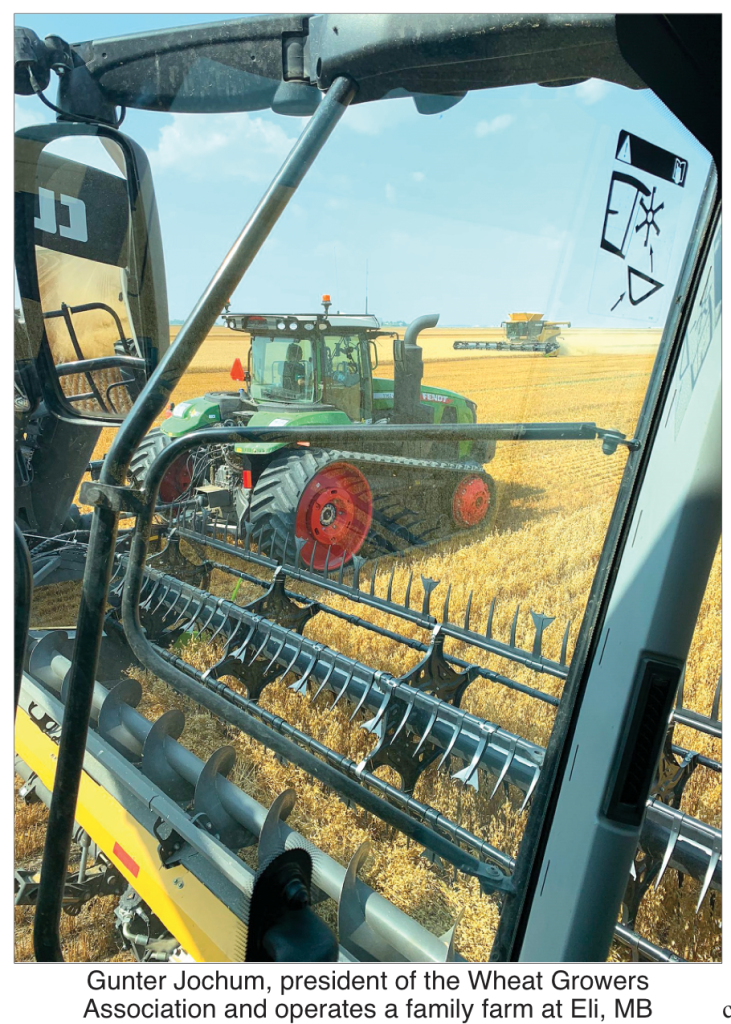
As families across the nation sit down to meals featuring bread, pasta, cereals, and the occasional beer, a looming federal policy threatens to escalate the cost of these staples or, worse yet, make them inaccessible.
Gunter Jochum, president of the Wheat Growers Association and operates a family farm at Eli, MB, said the repercussions of inflation, primarily driven by COVID-19 and monetary policies, have been felt by all. Still, it has hit the hardest for those struggling to put food on the table. Concurrently, supply chain disruptions have left store shelves empty of essential items.
“However, the most troubling aspect is that this situation is poised to deteriorate,” said Jochum.
Federal policies are creating obstacles for the production of affordable and nutritious food. The carbon tax has already burdened farmers, inflating food prices at various production stages.
The latest threat comes from an arbitrary 30 per cent reduction in nitrogen-based fertilizer, proposed without consulting the fertilizer industry or Canadian grain farmers. Such a drastic reduction could have disastrous consequences, affecting not only Canadians but potentially causing food shortages on a global scale.
Jochum said wheat, a staple food for 35 per cent of the world’s population, is Canada’s largest field crop.
“Our nation ranks fourth globally in wheat production, exporting to 70 countries and contributing 12 per cent to the world’s wheat supply.”
With the ongoing war in Ukraine, which poses a significant threat to wheat production, Canadian wheat production has never been more critical.
However, if farmers have to reduce fertilizer significantly while input costs continue to rise, farmers will undoubtedly produce less. This reduction in production will inevitably lead to increased food costs and further strain an already fragile supply chain. The economic principles are straightforward, and the most vulnerable in society will bear the brunt of rising prices.
Jochum said paradoxically that Canada’s highly efficient farmers use less fertilizer than many other nations and employ modern agricultural technologies to produce crops sustainably. If Canada reduces its production, less efficient countries will need to fill the gap, leading to a net increase in global fertilizer usage.
In addition to these perplexing policies, the federal government has set ambitious targets to increase Canadian agricultural exports by 55 per cent by 2025.
“It’s a desire to have one’s cake and eat it too, and these policies don’t add up. They will harm families and could contribute to food shortages and even famine,” he said. “The time has come to act and safeguard our food supply.”
The Wheat Growers Association, a voluntary farmer-run advocacy organization, is dedicated to developing policy solutions that enhance the profitability and sustainability of farming, benefiting the agricultural industry as a whole. However, we need help to achieve this. We need the support of everyday Canadians who recognize the concern.
The Wheat Growers Association has achieved tangible policy improvements since its establishment in 1970. It has played a pivotal role in eliminating inter-provincial boundaries on feed grains, promoting freer trade with the United States, Mexico, and Europe, advocating for grain transportation reform, removing quotas on canola, flax, and feed grains, and championing market freedom by eliminating the Canadian Wheat Board. The association recently convinced the federal Minister of Agriculture and Agri-Food to reverse course on imposing grading standards on country elevator deliveries.
Jochum said the Wheat Growers Association is a not-for-profit citizen’s organization, and its success depends on the voluntary support of everyday Canadians who share these concerns.
“Increased support will amplify our voices and make our elected leaders more attentive to our calls.”
This citizen involvement is especially crucial when government policies directly impact our citizens’ well-being.
Every Canadian has experienced the inflationary effects of the federal government’s carbon tax and COVID-19 monetary policies. Without action, the looming threat of fertilizer cuts could exacerbate the situation, potentially leading to global food shortages and famine.
The Wheat Growers president called on support from every segment of Canadian society in signing the petition, sharing the message and supporting the efforts of the Wheat Growers Association to lobby the government and mobilize Canadians with a contribution.
“Stand with us to secure our food future.” •
— By Harry Siemens





